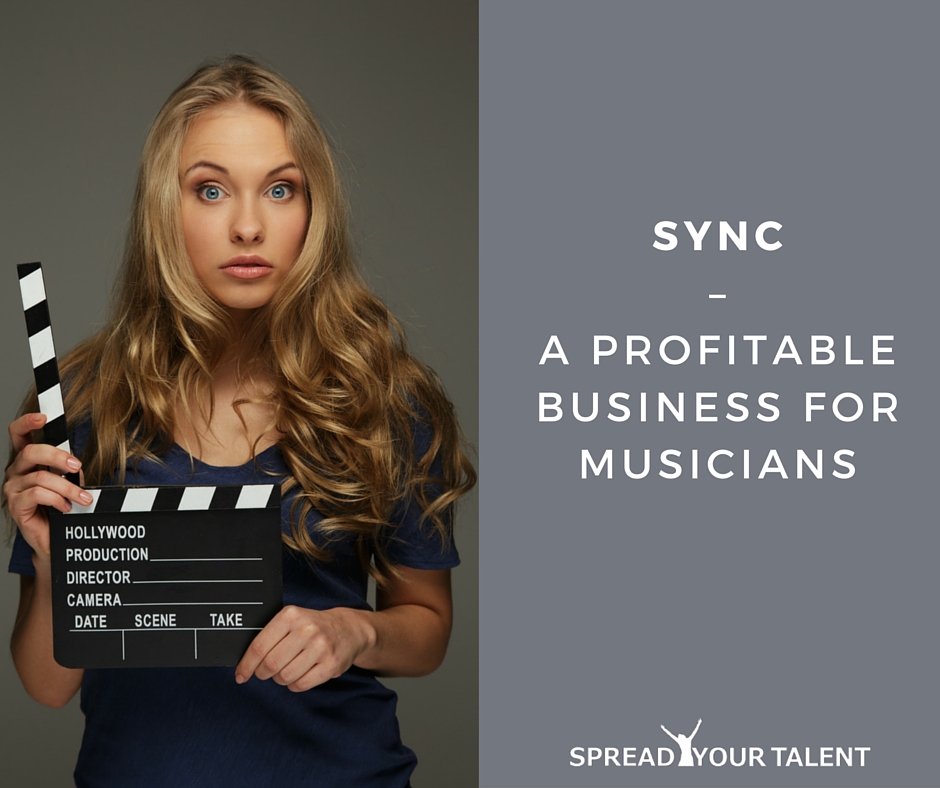
The synchronisation of music in audio-visual media; short: producers of films, television shows, documentaries and commercial spots use finished music to underscore their productions – and pay for it.
Sync, aka music licensing, is not that new anymore, not even for unsigned musicians. Quite a good number of musicians, especially in the U.S., is making a serious income offering their music to the sync market. However, there still remain a number of questions and as usual, there are a few crooks out there. Let me walk you through it bit by bit…
What does the Sync Business look like?
A production company pays a fee to be allowed to use a certain piece of music in its film- television- or commercial production, usually in a very clearly pre-determined way. In most cases this license grants the production company the right to use a said song only once within a project, e.g. a one-time use in film xyz for a duration of 25 seconds.
Master License
In the business of sync musicians get paid twice. The aforementioned license relates to the use of the master recording. This license and the connected fee is often called a master license, sync fee or needle-drop fee. This fee is being paid to the owner of the master recording, which can be a record company, a producer, an intermediary or a self-managed musician.
Backend Royalties
Now being a member of a performing rights organisation will pay off. Whenever the film, TV show or commercial that contains music airs on television, the TV network pays money to the performing rights organisations who will then forward royalties to the rights owners. These rights owners can be the composers, lyricists and publishers of the music in use. Once the production even airs in foreign countries or gets duplicated on DVD royalties can quickly manifold.
So musicians can generally cash in twice: once as the ‚producers’ of the recording as well as the ‚inventor’ of the melodies and lyrics. Lucky who’s both in one.
Chances for unknown musicians
For unknown musicians there are two opportunities to enter the sync world. One is so-called ‘production music’. This is instrumental music that is being used to enhance certain atmospheres in a film production. Think of fast rock music in extreme sports or some dreamy guitar tones in a holiday documentary. In the field of production music I can sense an increasing demand for authentic and organic music as opposed to the sterile productions of many allround musicians that have given production music a bad name over the years.
Another chance lies in real vocalized songs. Film producers and music supervisors often have a specific popular song in mind which turns out to be either unavailable or too expensive to license. That is when producers look for similar songs from less popular artists that have a similar vibe or tempo but come at a lower fee. It’s a win-win situation for both parties. Producers stay on budget while unknown artists can reap in a good chunk of money.
The Dark Side
The internet is also a hotbed for shady business models. Some ‘clients’ and even publishers offer not to pay any licensing fees at all while musicians shall benefit from the publicity they get. This is often advertised as ‘get free promotion for your music in a film’. The advertising effect, however, is usually near zero, especially as production music is concerned.
Another new trend in the ‘good advice business’ are micro licenses, which musicians are being paid any time someone uses their music in a youtube video – often amateur videos, and the compensation does never justify the means: The effort needed to get a song placed is actually the same as trying to get it placed in a TV show, except that the latter pays a lot more money.
Bottom line
Unsigned musicians definitely have a chance to make it in the sync business and play with the big boys once they realize there is more than just the same old poor man’s methods which they are having shoved down their throats all the time.
About the Author:
Julian Angel has placed his hard & heavy tracks in Hollywood movie productions starring Mickey Rourke, Dolph Lundgren, Steven Seagal and Selena Gomez as well as TV networks such as CBS, HBO and TLC.
Julian will be happy to show you in depth how you can profit from Sync in a one-on-one consultation (Skype or phone). –> Click and Learn More!
